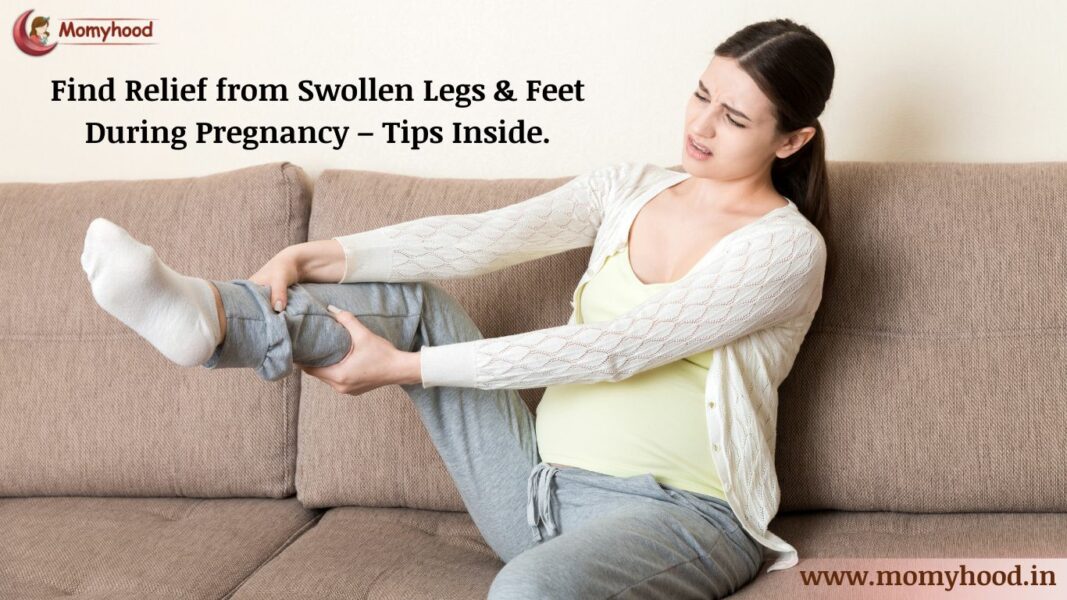Pregnancy is a time of joy, anticipation, and, of course, many physical changes. One of the common discomforts that expectant mothers experience is swollen legs and feet in pregnancy. While this condition is generally normal, it can be uncomfortable and sometimes concerning. In this blog, we will explore why swollen legs & feet in pregnancy occur, how to alleviate the discomfort, and when you should consult your healthcare provider.
Contents
- 1 What Causes Swollen Legs & Feet in Pregnancy?
- 2 How to Relieve Swollen Legs & Feet in Pregnancy
- 3 When Should You Be Concerned About Swollen Legs & Feet in Pregnancy?
- 4 Lifestyle Adjustments to Reduce Swollen Legs & Feet in Pregnancy
- 5 The Emotional Aspect of Swelling in Pregnancy
- 6 Conclusion: Embrace the Journey
What Causes Swollen Legs & Feet in Pregnancy?
Swollen legs and feet, medically known as edema, are common during pregnancy, especially in the third trimester. This happens because your body is producing more blood and fluids to support the growth of your baby. The growing uterus also puts pressure on your veins, making it harder for blood to return from your legs to your heart. This causes fluid to build up in the tissues, leading to swelling.
Common Causes of Edema
- Hormonal Changes: Pregnancy hormones, particularly progesterone, cause blood vessels to relax, leading to increased fluid retention.
- Increased Blood Volume: Your body increases blood flow to nourish the baby, resulting in more fluid accumulating in tissues.
- Pressure from the Uterus: As your baby grows, the expanding uterus can compress veins, particularly in the lower body, contributing to swelling.
- Positioning: Sitting or standing for extended periods can hinder circulation, worsening swelling in the legs and feet.
- Heat and Humidity: High temperatures can dilate blood vessels, further contributing to swelling.
While swollen legs & feet in pregnancy can be uncomfortable, it’s typically harmless. However, there are instances when it may indicate a more serious condition, such as preeclampsia, which requires immediate medical attention.
How to Relieve Swollen Legs & Feet in Pregnancy
Thankfully, there are several ways to reduce and manage swollen legs & feet in pregnancy. Here are some tried-and-true methods to find relief:
Stay Active and Exercise Regularly
One of the best ways to prevent fluid from pooling in your legs and feet is to keep moving. Exercise, such as walking, swimming, or prenatal yoga, helps improve circulation. It’s a great way to encourage blood flow from your legs back to your heart, reducing swelling.
Tip: Try swimming or water aerobics. The pressure of water can help reduce swelling in your legs and feet. Aim for at least 30 minutes of moderate exercise most days of the week. Always consult your healthcare provider before starting any new exercise routine.
Elevate Your Legs
Elevating your legs as much as possible can help drain fluid from your lower extremities. If you’re sitting, prop your legs on an ottoman or chair, and if you’re lying down, place pillows under your legs. This allows gravity to assist with reducing the swelling.
Tip: Avoid crossing your legs while sitting, as this can restrict circulation and worsen the swelling.
Wear Compression Stockings
Compression stockings or support hose can help improve blood flow and reduce swollen legs & feet in pregnancy. These stockings gently compress the legs, helping to move fluid back toward the heart.
Tip: Consult your doctor or midwife for recommendations on the right type of compression stockings for you.
Stay Hydrated and Limit Salt Intake
It may sound counterintuitive, but staying hydrated helps prevent water retention. Drinking plenty of fluids helps flush out excess sodium, which can contribute to swelling. At the same time, limit your salt intake, as high levels of sodium can lead to water retention.
Tip: Avoid processed foods that tend to be high in salt and opt for whole, unprocessed foods. Aim to drink at least 8-10 glasses of water daily, and limit your intake of processed foods that are typically high in salt.
Avoid Standing or Sitting for Long Periods
If you’re on your feet for long periods, take regular breaks to sit down and elevate your legs. If you sit for long stretches, make sure to stand up and walk around every hour to keep your blood circulating.
Tip: When sitting at work or home, practice calf exercises like rolling your ankles or stretching your legs to improve circulation.
When Should You Be Concerned About Swollen Legs & Feet in Pregnancy?
While swollen legs & feet in pregnancy are usually harmless, there are situations where swelling could be a sign of a more serious condition, such as preeclampsia. This condition is characterized by high blood pressure and other symptoms, such as severe swelling, headaches, and changes in vision.
Signs to Watch For
- Sudden or Severe Swelling: If you notice sudden swelling in your face, hands, or one leg, contact your healthcare provider immediately.
- High Blood Pressure: Regular monitoring of blood pressure during pregnancy is essential. If you experience headaches or blurred vision alongside swelling, seek medical attention.
- Pain or Tenderness: If swelling is accompanied by pain, redness, or warmth in one leg, it could signal a blood clot, requiring urgent medical evaluation.
Lifestyle Adjustments to Reduce Swollen Legs & Feet in Pregnancy
A few lifestyle changes can make a big difference in managing swollen legs & feet in pregnancy. Incorporating healthy habits like regular exercise, staying hydrated, and reducing salt intake can help you feel more comfortable throughout your pregnancy.
Try Swimming or Water Therapy
Swimming or engaging in water aerobics is a fantastic way to relieve swelling. The hydrostatic pressure of the water helps reduce fluid accumulation in your legs and feet.
Tip: Even a gentle walk in the pool can provide substantial relief from swelling.
Rest and Sleep on Your Side
Sleeping on your left side is beneficial during pregnancy. This position helps improve blood circulation and reduces pressure on your veins.
Tip: Use pillows to support your body, which can also enhance comfort while sleeping.
Massage and Cold Compress
Gentle leg massages can stimulate blood flow, while cold compresses can help reduce inflammation and numb the area.
Tip: Consider using a cold pack wrapped in a cloth to avoid direct skin contact.
Incorporate Foods Rich in Potassium
Foods high in potassium, such as bananas, avocados, and sweet potatoes, can help balance fluid levels in your body, potentially reducing swelling.
Tip: Including a variety of fruits and vegetables in your diet can provide essential nutrients beneficial for both you and your baby.
The Emotional Aspect of Swelling in Pregnancy
Dealing with swollen legs & feet in pregnancy can take an emotional toll on expectant mothers. Physical changes, while a natural part of pregnancy, can sometimes lead to feelings of frustration, discomfort, and even anxiety. Many women experience a range of emotions during this transformative period, and it’s important to acknowledge and address them.
Understanding Emotional Reactions
It’s completely normal to feel frustrated with your body as it undergoes various changes. The swelling can be uncomfortable and may lead to feelings of unattractiveness or helplessness. These feelings are compounded by the hormonal changes that come with pregnancy, which can affect your mood and emotional well-being.
Self-Care Strategies
Practicing self-care is crucial during this time. Here are a few strategies to help manage the emotional impact of swollen legs & feet in pregnancy:
- Mindfulness and Relaxation Techniques: Incorporate practices such as yoga, meditation, or deep breathing exercises into your daily routine. These techniques can help reduce stress and improve your overall emotional well-being.
- Pamper Yourself: Take time to indulge in activities that make you feel good. Whether it’s a warm bath, a soothing foot massage, or simply relaxing with a good book, prioritizing your comfort can significantly enhance your mood.
- Connect with Others: Sharing your experiences with friends, family, or fellow expectant mothers can provide valuable emotional support. It’s reassuring to know that others are going through similar experiences and can offer understanding and advice.
- Journaling: Keeping a pregnancy journal can be a therapeutic outlet. Writing about your feelings, challenges, and joys can help you process your emotions and reflect on your journey.
- Seek Professional Help: If feelings of frustration or anxiety become overwhelming, consider speaking to a counselor or therapist who specializes in pregnancy-related issues. They can provide guidance and strategies to help you cope effectively.
Joining Support Groups
Consider joining a prenatal support group where you can connect with other mothers-to-be. Sharing experiences and discussing challenges with peers can create a sense of community and help alleviate feelings of isolation. These groups often provide a platform for discussing not only physical symptoms but also the emotional rollercoaster that comes with pregnancy.
Conclusion: Embrace the Journey
Remember that pregnancy is a temporary phase filled with unique experiences. Although swollen legs & feet in pregnancy can be uncomfortable, embracing your journey and focusing on the excitement of welcoming a new life can help shift your perspective. Celebrate the small victories, whether it’s finding relief through self-care techniques or simply enjoying moments of connection with your baby.
Your comments and shares do more than just support our blog—they uplift the amazing moms who share their stories here. Please scroll down to the end of the page to leave your thoughts, and use the buttons just below this line to share. Your support makes a big difference!



